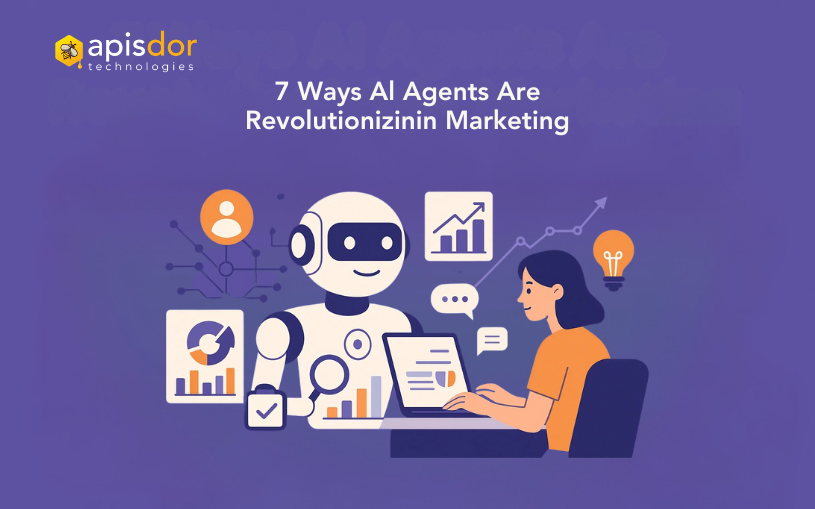Discover How AI Agents Revolutionize Marketing Success

In today’s fast-paced digital world, using technology is more than just a choice; it’s a requirement for any business that wants to succeed, especially in marketing. Imagine AI agents as intelligent helpers, crafted to improve marketing strategies and enhance how businesses operate. These tools have the power to analyze vast amounts of data at incredible speeds, uncovering patterns to help marketers make smart decisions. But what does this mean for your marketing efforts?
This blog post will explore seven vital ways AI agents can change the game for your marketing efforts. We will look at how they boost customer engagement, enhance personalization, optimize campaigns, streamline workflows, improve analytics, provide predictive insights, and support decision-making. By the end, you will see the importance and benefits of integrating AI agents into your marketing plan.
1. Enhancing Customer Engagement
Engaging customers is essential for creating loyalty to your brand. AI agents can help achieve this through chatbots, which are always ready to assist 24/7.
According to a study by Gartner, over 85% of customer interactions will be managed without a human by 2026.
These AI-powered solutions can comprehend customer inquiries, deliver instant replies, and even learn from past interactions to enhance future responses.
Additionally, AI agents customize interactions based on what customers prefer and how they behave, allowing businesses to connect with their audience more authentically. This creates trust and encourages repeat business.
2. Boosting Personalization in Marketing
The old approach of treating all customers the same is fading away. AI agents are crafted to offer unique experiences for each customer. They examine data from various sources to grasp individual preferences, purchase history, and browsing patterns. With this information, AI can suggest products or content that are more likely to resonate with each customer.
Introducing personalization boosts engagement rates. A study found that personalized emails achieve transaction rates six times higher than generic ones. By making customers feel special, companies can greatly improve their marketing success.
3. Optimizing Marketing Campaigns
AI agents shine when it comes to optimizing marketing campaigns through automation. They can determine which marketing channels perform best and adjust budgets accordingly. This guarantees the highest possible return on investment (ROI) for each campaign.
Moreover, AI can conduct A/B testing independently, simplifying the process of figuring out which ads or email versions resonate better with the audience by analyzing real-time data and outcomes.
4. Streamlining Workflow
AI agents are great at managing repetitive tasks, which allows marketing teams to concentrate on strategic initiatives instead. By automating jobs such as data entry and social media scheduling, businesses can streamline their workflows and boost productivity.
According to a report by McKinsey, businesses that automate routine tasks can improve productivity by up to 40%. This lets marketing teams concentrate their energy on the creative and analytical aspects of their projects.
5. Enhancing Data Analytics
Data analysis is essential for crafting marketing plans, and AI agents can significantly improve this aspect. They quickly sift through vast datasets, identifying trends that human analysts might miss. This enables more informed, accurate decisions based on real insights.
AI tools can generate detailed reports that visualize data, making it easier for marketers to grasp information and make decisions based on data.
6. Providing Predictive Insights
The predictive capabilities of AI allow marketers to forecast trends and consumer behavior. By harnessing historical data and machine learning, AI agents can anticipate future customer actions. This foresight helps companies meet needs and customize their strategies accordingly.
This proactive mindset can tremendously improve customer satisfaction and loyalty by delivering the right content at the right moment.
7. Facilitating Decision-Making Processes
At last, AI agents aid marketing teams in making crucial decisions by providing insights derived from data. Instead of leaning solely on intuition, teams can depend on AI-driven data analysis to decide the best course of action. This can minimize mistakes that might be costly and aligns marketing efforts with business targets.
Investing in AI for marketing goes beyond keeping up with trends; it focuses on becoming a leader in a competitive landscape. Embracing this technology can lead to more effective strategies and superior results.
Conclusion
In summary, AI agents are reshaping the marketing landscape. From enhancing engagement to delivering deep insights, these smart tools are crucial in modern marketing strategies. As more businesses incorporate AI, those who successfully blend these agents will likely gain notable advantages in efficiency and effectiveness.
Understanding these benefits is the first step towards leveraging AI agents to achieve lasting marketing success. The moment to consider how AI can elevate your marketing strategies is now.
FAQs
Q1: What are AI agents in marketing?
A: AI agents in marketing are intelligent systems crafted to automate tasks, analyze data, and enhance customer interaction, making marketing strategies more efficient and tailored.
Q2: How can AI agents improve customer engagement?
A: AI agents enhance customer engagement by offering instant assistance through chatbots, analyzing customer behaviors, and personalizing interactions to build stronger connections with clients.
Q3: What is predictive analytics in marketing?
A: Predictive analytics in marketing employs historical data and machine learning to forecast future consumer behaviors, assisting businesses in effectively tailoring their marketing strategies.
Q4: Can AI agents streamline company workflows?
A: Yes, AI agents can automate repetitive tasks like data entry and scheduling, allowing marketing teams to focus on strategic initiatives and boosting overall productivity.
Q5: Why is personalization important in marketing?
A: Personalization is critical since it enhances customer experiences and elevates engagement rates, leading to improved conversion rates and fostering customer loyalty.
